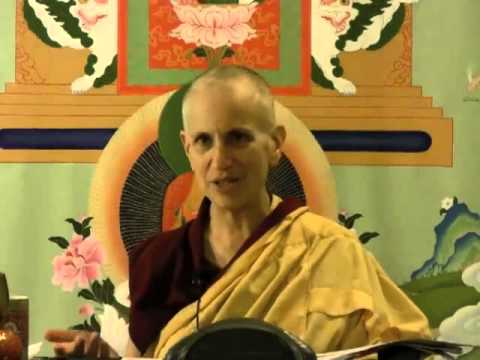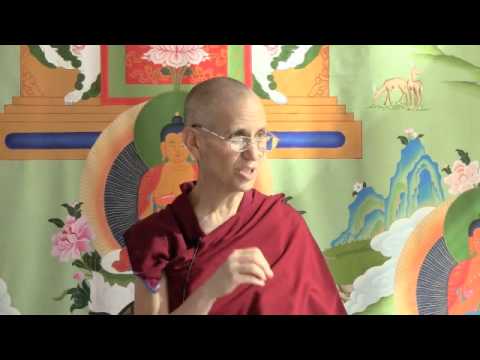Reducing arrogance, cultivating humility
Reducing arrogance, cultivating humility
A Crown Ornament for the Wise, a hymn to Tara composed by the First Dalai Lama, requests protection from the eight dangers. These talks were given after the White Tara Winter Retreat at Sravasti Abbey in 2011.
- Becoming arrogant in the Dharma can become a hindrance to learning
- The benefit of practicing humility
The Eight Dangers 02: Pride continued (download)
Okay, so we’re still talking about arrogance, pride, conceit…
So there are many different things that we can get arrogant about:
- Our physical appearance.
- Our physical strength.
- Our athletic ability.
- Our intelligence.
- The amount of knowledge we have.
- Particular talents we have, musical or artistic.
- Particular skills: working with computers or machinery or cooking…
You name it, we can get proud of it. Okay?
This doesn’t just happen in our regular careers or regular life, but also in the Dharma. When people first come to the Dharma they’re usually fairly humble because they don’t know very much. But then when they’ve been around a bit, they get a little bit—kind of— “Oh, I’ll show you the way. You don’t know how to do that? Well let me tell you because this is the way we do it.” You know? And we can get really kind of arrogant in the Dharma, thinking that we know a lot, we’ve accomplished a lot, we’re very knowledgeable and so therefore other people should look up to us, they should respect us, they should put us in the front row. This happens with monastics. “Oh, I’ve been ordained longer than you, get out of my way.” [laughter]
Actually, it’s really sweet. Usually at big teachings you always know the new monastics because they go sit in the very front. They don’t know they’re supposed to sit in the back. [laughter]
We can get arrogant about everything and you name it. It’s something to really be on guard against. Because arrogance is a big hindrance to learning. Because if you know it all then your mind is never open to learning anything more. So the Tibetans have a saying that “no grass grows on the top of the mountain, it only grows in the valley.” So a person who considers himself (or herself) very high can’t learn anything, he’s just the rocky crag at the top of the mountain and not the lush, fertile valley where things can actually grow.
That’s why we do the practice of prostrations a lot. It’s to make us humble. I mean, it shows respect for the Buddha. It also purifies. But it’s also a practice of humility, to remember that we are the servants of other sentient beings. And that as long as our minds are filled with ignorance, anger, and attachment there is absolutely nothing to get arrogant about.
Because even if we have a good rebirth now, if we create a lot of negative karma then we have a bad rebirth in the future, so what’s there to be arrogant about? A little bit of status or whatever we have right now doesn’t mean much. It’s just a temporary condition that’s produced by causes and conditions.
The same thing goes for having a precious human life. It’s nothing to get proud about, it’s something to use wisely because we won’t have it for very long.
When in doubt it’s good to be humble. As antithetical as that is to the American system, where we are taught here to sing our own glories. Aren’t we? You know, you go in for a job interview, you never say you can’t do anything. Even if you can’t. It’s, “Well I have some experience in that.” (What is it?) But you see, we have such a hard time— And the system expects us to just know everything, or to pretend we know everything.
I remember once I was with a young person who was applying for college and she had to write an essay about herself, and I encouraged her to write not only her good qualities and what she liked, but also her weaknesses. And this person was very upset with me. And so were the parents. It’s like, “How dare you say that?” And I was thinking, you know, if I get an application from somebody who is talking honestly about themselves, then I’m going to notice that and be more inclined to select that person than somebody who is trying to pull the wool over my eyes. Or somebody who is totally out of touch with themselves and thinks they’re excellent and everything. But I saw very quickly that not everybody shares that opinion about who they would select.
But if you’re in the Dharma a lot—and this is something you really see in Tibetan culture—kind of you’re taught to be humble, you’re taught not to brag, and so on. And so that’s an advantage to be in a place where that kind of attitude is encouraged, rather than the attitude: “Here I am.”
That doesn’t mean losing our confidence. It doesn’t mean hiding our qualities. If we know something, if we have some ability, we should say so. But that’s quite different than exaggerating our qualities and making ourselves more than we are. But we should say what abilities we have, because we want to help sentient beings. And if we don’t tell them what we’re good at doing, they can’t ask us for that particular kind of help.
Venerable Thubten Chodron
Venerable Chodron emphasizes the practical application of Buddha’s teachings in our daily lives and is especially skilled at explaining them in ways easily understood and practiced by Westerners. She is well known for her warm, humorous, and lucid teachings. She was ordained as a Buddhist nun in 1977 by Kyabje Ling Rinpoche in Dharamsala, India, and in 1986 she received bhikshuni (full) ordination in Taiwan. Read her full bio.


